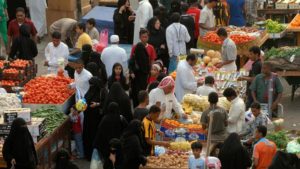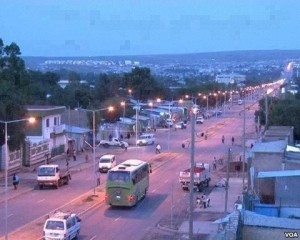By Faisal Roble
Editor’s Note: Ramadan commemorates the precious month in the Islamic calendar and it is obligatory for the Muslims to fast. It’s when the Holy Quran was first revealed to Prophet Mohamed (Peace be upon him). It’s the time of spiritual reflection, improvement and increased devotion and worship. So WardheerNews, would like to once again share with our valuable readers, Faisal Roble’s article, Remembering Ramadan, taking us back to the joy of welcoming this important month for Somalis and Muslims around the globe.
__________
Ramadan brings the believer closer to his/her Creator; it is also time for reflection of yesteryears. Although I share with the Ummah the resolve to be close to God, I couldn’t resist this year but remunerate some aspect of my childhood in Jigjiga during Ramadan time.
 The scent of different foods, serene environment, hypnotic and rhythmic Qasiida, songs of praise for the prophet and unbridled freedom after Iftar are what Ramadan used to bring to my childhood in an otherwise oppressive political space.
The scent of different foods, serene environment, hypnotic and rhythmic Qasiida, songs of praise for the prophet and unbridled freedom after Iftar are what Ramadan used to bring to my childhood in an otherwise oppressive political space.
Ramadan is that one month where Muslims seek proximity to God through prayers and fasting. Even those in other faiths have noticed that the unique proximity Muslims enjoy with their Creator is more evident than in other faiths. The late Peter Jennings, who served as ABC news’ bureau Chief in Beirut for a long time once prepared a fascinating report on “Islam.”
Jennings emphasized the constant interaction Muslims have with God and their proclivity to invoke their Creator’s name all the time. In Islam, one’s life is intertwined with God’s omnipresence. When about to sleep, sneeze, face serious danger, experience a mishap like tripping over a rock in the street, a Muslim inimitably calls God for mercy by saying “Bismilah.”
A constant interaction with God, augmented by praying five times a day, fasting for an entire month coupled with doing good deeds for each day of the month, and regularly reciting the Quran mark an unshakeable bond with God.
Memorable experiences
The evening before, Ramadan was always proceeded by big arguments and squabbles on whether the moon had been cited. My father and his friends would stay behind at the Mosque after Maqrib for a definitive answer. Most often Radio Mogadishu would deliver that definitive and final answer whether to begin fasting or not. Once the famous Ramadan hymn “Marxab Marxab yaaa Ramadaan” was broadcasted over Radio Mogadishu, the squabble would end and Ramadan would be pronounced final.
In the ensuing hours of that night things around the city would quickly change; a new landscape marked by neon lights, Quran recitation blasting the airwaves, and chaotic but purposeful last minute shopping would dominate the public domain. The fervor and fanfare exhibited in every corner of the city represented collective graceful efforts to welcome Ramadan.
For the next 30 days, residents of the city would scale down their daily regular chores; restaurants would completely close their doors except for dinner. However, business would always lit up in late afternoon following Asar prayers
Each afternoon, the main spine of the city, Sakatal Ubax, which runs through the neighborhood I grew up, would be activated with massive pedestrian activities. Stores on the banks of Sakatal Ubax, like elsewhere, had by now received face lift and facade treatments in the form of new paintings, neon lights, and manicured lawns. In short, a new glitz of the city would emerge.

Also, cars and trucks would be diverted from Sakatal Ubax, and the entire roadway would be converted into a communal space to enhance pedestrian experience. In effect, Sakatal Ubax would be filled to the prim with foot traffic and only with those that fast; non-fasting folks avoid it out of shame.
All this order is not because of government intervention but by the power of volunteerism of city dwellers who are united by a purpose.
Anyone in the city of any stature would at least once walk through Sakatal Ubax and do window shopping for the nightly Iftar goodies.
On both sides of the street would line up horizontally arranged tables attended by men and women of all ages who show resolve to sell their Sambusa, Mushabag, Shaami, Muqasqas, timir (dates), Baagiye, and many other sweets intended for Iftar consumption. One way to attract customers to one’s goodies is through a unique Ramadan hymns intended to please the fasting Muslim.
Entertain with attornment
In unison, all the vendors who are lined up on both sides of Sakatal Ubax would sing in unison:
Faduurak yaa Saa’im,
Alah waliyak yaa Saa’im,
Mahamed Nabiyak yaa Saa’im
Vendors would sing this hymn ad nauseam with a twist of religiosity that not only entertained but also enticed the appetite of the Saa’im (the one who had fasted the entire day), while unapologetically excluding those who fail to heed the word of God.
Every afternoon during Ramadan, my father would come down from his Agip Petroleum station office to Sakatal Ubax to pass time and also pick up his daily goodies for Iftar. While walking and holding the hand of my towering 6’ and 2”-tall father, I would try to steer him to one particular vendor attended by the family members of Cabdela Salan. I had hoped that daughter Cabasa Cabdela would be there.
Despite my tender age then, I confess that I had a boyish crash on Cabasa and my siblings knew that. My dad would always remain oblivious to my devious intentions and would go to the table of Ina-Mahamed Qaasim; dad loved Ina Mahamed Qaasim’s Baagiye and would always go to her table and buy his goodies. Failing to convince him to go my way, I would entertain myself with the notion that tomorrow would be the day he would stop by Cabasa’s table.
Before my father reaches our house, he would stop by aunt Khadija Awlibax and pick a jar full of her unique shorbad (a unique porridge made of barley, lamb chops and different seasoning boiled for over 6 to 8 hours, Shorbad, served with a touch of vinegar, was a must Iftar dish).
With him at Khadija Awlibax’s house would every now and then show up the recently deceased Suldan Mohamed Sheikh Hassan Wa’di, who was the governor of Jigjiga and a distant cousin of my father. Aunt Khadiji simply prepared an unbeatable shorbad thanks to her familial association with the multi-cultural community of Hararis and Arabs in the city.
The two or so hours between Iftar and shopping for sweets at times sounded longer. Hunger would get more pronounced as the sun started setting slowly and the prospect for Iftar gets within reach. To make the mind busier and orient it away from the sweets rolled in my dad’s hand, he would sing these du’a verses:
Yaa Tawaab;
Tub Calaynaa;
Weli Waalidaynaa
Yaa Tawaab…
His voice sent a message of total conviction to never touch those sweets until the adan is called for prayers. Like many Somali boys, it was never lost on me that my father was a man who wanted to impart strong Islamic values. That is why I still recall this du’a, although I have never seen it in writing. It is part of an oral knowledge imparted to me as a Somali Muslim boy.
Iftar time is akin to a mini Eid or holiday, only in this case a daily occurrence for the entire 30 days of Ramadan. I would sit down next to my dad and eat the Iftar and all the sweets I could consume. Then comes the Taraawih prayers that ran as much as 23 ra’kats. Although tough on my dad’s screeching knees, he always enjoyed Taraawih both as part of his debt to Allah and as an exercise.
Fun after Sunset
Most of my boyish fun with Ramadan would start only after the Taraawih. My dad would divert his attention of the remaining hours of the night to his group called Shirqil Awasad (the Middle East group). These were Jigjiga elders who would together deliberate all night long on news from BBC, Cairo, Radio Mogadishu, and elsewhere; they would analyze world politics and how it impacts the Somali condition.
On my end, I would freely hit the dusty streets with my friends and do anything we desire; Ramadan was synonymous to a broad freedom and less parental control. As soon as dad leaves house, I would go to the city’s cinema house and see Western, which we called “filin Taxaas ah” or Indian movies. It was then that I have seen movies that ranged from “High Noon” to “Mother India.” I learned later on in my adult life that both movies were highly political.
Then would follow a visit to Ina-Byale’s restaurant; Ina Bayle’s joint had the best Qasida and drum. One Sigad Yare would beat the drum just like a Rock-and-Roll drummer does at a Western concert. Although once in a while Sigad Yare’s tune would resemble that of a Western drum to our delight, he would always quickly change it back to the traditional beat to stay course and respect the spirit of the majority of the clients. In general, though, Sigad’s drum would remain a sophist beat choreographed to match mesmerizing Qasida recited by a shaafici sheikh. It was uncommon to see once in a while someone who transcended to the heavens (jibo ayaa qaaday).
Half way into Ramadan, we would suddenly hear over the radios and from religious cells called “Maqaam” that the song of Marxab Marxa yaa Ramaadan giving way to “Wadac Wadac yaa Ramadaan.” That was an indication of the coming of an end of Ramadan. It was also an early warning system that Eid was in the horizon.
Soon teenage conversation with my friends would shift into shopping and whether Hassan Handaad, Ina-Farad, or Haji Abodo brought new stylish attire for the Eid. Some may here and there throw suggestions to also look into the Indian stores. But no one matched the trendy merchandise that Hassan Handaad and Ina Farad brought to the town.
My father always took us to Ina Farad because of marriage relationship (Ina-Farad was a cousin of the famous artist Abdelle Nurradin Ahmed of Somali National Theater). Both Handaad and Ina-Farad were unquestionably reliable and commanded most of the male youth market. As to the Indian stores, their collections were largely attractive to girls.
As the Eid day approaches, my dad would start helping me memorize the Takbiiraad hymn of:
Allaahu Akbar, Allaahu Akbar, Lee Ilaaha Ilaa Ilaalhu, Alaahu Akabar Walilaahil Xamdi… Only then would I know that Ramadan is in its last days. I would then start trying my new attire and shoes every chance I get until the big day comes.
Ramadan comes in style and exits graciously.
Faisal Roble
Email:[email protected]
—
Faisal Roble, a writer, political analyst and a former Editor-in-Chief of WardheerNews, is mainly interested in the Horn of Africa region. He is currently the Principal Planner for the City of Los Angeles in charge of Master Planning, Economic Development and Project Implementation Division.
We welcome the submission of all articles for possible publication on WardheerNews.com. WardheerNews will only consider articles sent exclusively. Please email your article today . Opinions expressed in this article are those of the author and do not necessarily reflect the views of WardheerNews.
WardheerNew’s tolerance platform is engaging with diversity of opinion, political ideology and self-expression. Tolerance is a necessary ingredient for creativity and civility.Tolerance fuels tenacity and audacity.
WardheerNews waxay tixgelin gaara siinaysaa maqaaladaha sida gaarka ah loogu soo diro ee aan lagu daabicin goobo kale. Maqaalkani wuxuu ka turjumayaa aragtida Qoraaga loomana fasiran karo tan WardheerNews.
Copyright © 2024 WardheerNews, All rights reserved


